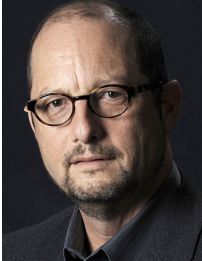On this date in 1955, author and New Testament scholar Bart Denton Ehrman was born in Lawrence, Kansas, and was raised there after an eight-year hiatus in Fremont, Nebraska. He was a member of Lawrence High’s state champion debate team in 1973.
“We were fairly religious. I would say my mother especially was very devout, and we were faithful churchgoers. But we in the Episcopal Church tended to go to the 7:30 service so we could be on the golf course by nine.” (North Carolina Public Radio, March 5, 2018)
He was confirmed in the church and served as an acolyte throughout high school. In his junior year he was “born again” after joining a Youth for Christ club, later gravitating to the Lawrence Bible Chapel, a Plymouth Brethren congregation, which his parents also joined.
“I was terrified of going to hell,” he said in a 2020 interview. “It made me a rather obnoxious fundamentalist Christian because I thought that everybody else was going to go to hell, and so I had to go out of my way to convert them all. So I wasn’t always a pleasant person to be around because I was right and they were wrong, and since they were wrong, they were going to hell.” (NPR “Fresh Air” March 31, 2020)
After completing a three-year diploma program at the Moody Bible Institute in Chicago, he earned a B.A. at Illinois’ Wheaton College. Then his higher ed continued at the Princeton Theological Seminary with an M.Div. in 1981 and a Ph.D. in 1985.
He stayed in New Jersey to teach at Rutgers University and joined the religious studies faculty at the University of North Carolina in Chapel Hill in 1988, where he has served as director of graduate studies and the department chair.
Ehrman’s scholarship focused on the New Testament and history of early Christianity with numerous articles and book reviews. His over 30 books written or edited include several textbooks for undergraduates. Six have been on the New York Times bestseller list: “Misquoting Jesus: The Story Behind Who Changed the Bible and Why,” “God’s Problem: How the Bible Fails to Answer Our Most Important Question — Why We Suffer,” “Jesus, Interrupted: Revealing the Hidden Contradictions in the Bible,” “Forged: Writing in the Name of God – Why the Bible’s Authors Are Not Who We Think They Are” and “How Jesus Became God: The Exaltation of a Jewish Preacher from Galilee.”
“Armageddon: What the Bible Really Says About the End” (2023) is a deep dive into the New Testament’s Book of Revelation. Ehrman’s books have been translated into 27 languages.
In a 2021 blog titled “On Being an Agnostic Atheist,” which he calls himself, he defined agnostics as not knowing whether God exists compared to atheists who make a definitive statement that God does not exist. “Agnostics don’t know and atheists are sure. … Do I know whether there is a God in the multiverse? Nope. I really don’t. How could I know? I’m just a peon on a very big planet, circling around a very big star, which is one of some 100 billion stars in this galaxy.”
Atheism, he wrote, “is not about knowledge but about belief. Do I believe that there is a God? No, I don’t. I especially do not believe in the biblical God, or in the traditional God of Jews and Christians (and Muslims and so on). I simply do not believe that there is a God who created this world…”
He was the recipient of a 2011 Religious Liberty Award from the American Humanist Association and FFRF’s Emperor Award in 2014 for “plain speaking” by public figures on the shortcomings of religion. An interview with FFRF on the Emperor Award is here. A video of his May 2020 appearance on FFRF’s talk show “Freethought Matters” is here.
After an amicable divorce ended his first marriage, he married Sarah Beckwith, a professor of medieval literature at Duke University (and an Episcopalian). He has a daughter, Kelly, and a son, Derek. As of this writing in 2023, he lives in Durham with Sarah and their dog Billy.
PHOTO: Ehrman in 2012; photo by Dan Sears/UNC-Chapel Hill under CC 4.0.

